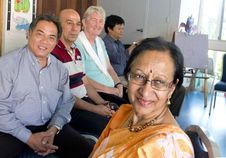 The latest horrors of Pakistan put the shock of the Sydney siege in perspective. Yet every pain matters and perhaps their close conjunction reinforces what a 'small' and ever more closely connected world we live in. Our own community actions for peace at this time therefore become even more part of the spiritual solidarity of all for all.
0 Comments
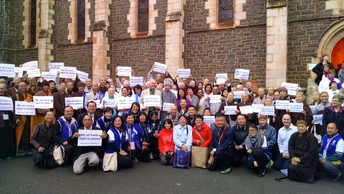 For a number of years in my last job I was a frequent visitor to the Lindt Café in Sydney’s Martin Place, the site of the recent Sydney siege. It was a common stopover after our combined New South Wales Churches’ executive meeting and a great place to relax and be refreshed. Ironically we also often discussed the many inter-faith and peace initiatives with which we were involved. For Sydney is an amazing place, full of so many different peoples, faiths and cultures. The range of that diversity can be a challenge but it is a great tribute to the city that so much positive inter-faith and peace prayer and action has been fostered over the years. This is part of what of what will enable Sydney, and the rest of Australia, to triumph and flourish after the tragedy of recent events. The Sydney siege is a further confirmation of how vital is our prayer and work for community harmony, not least through the Toowoomba ‘Model City of Peace and Harmony’ initiative. When such terrible events happen, as they happen in different ways daily across the world, they can either erode our trust in one another or impel us to renew our faith in the love at the heart of the universe, differently displayed in various faiths and cultures. The strong base of relationships we have already established in Toowoomba certainly puts us in a good position to support those who are afflicted, to share solidarity with Muslims and others who are afraid or fear victimisation, and to create new partnerships for peace in our lives and wider world. The recent events in Sydney remind us again of how ‘no one is an island’ and how we are all affected by what else happens in our world. At home, Australia has mercifully been free of such events but it has always been connected to them overseas. Such connections can now make us afraid, if we let them, or they can make us stronger than ever in the things that truly matter. From a Christian perspective, terror at Christmas should hardly be a surprise. Terror is written into the Christmas story itself. For Jesus was born into an oppressive and violent society, and, according to the scriptural stories, the holy family was forced to flee into Egypt as refugees, in the face of Herod’s massacre of the innocents. Yet Christ’s birth stands as a sign that such darkness, then and now, is not the end. There is something much, much stronger and deeper and transforming. So let us trust in that Spirit, shown also in the Magi, people of very different faith and culture, who left their comfort to share the light and love of God at the birth of Jesus. May that peace prevail in our hearts, our community and our world, that Toowoomba with Sydney may be fresh beacons of compassion and peace in the days ahead. Let us ride together on the path of peace. 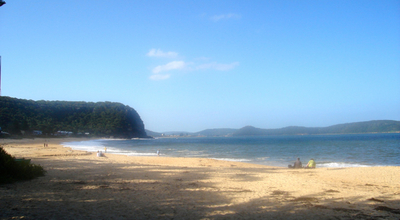 This week I had a few days away on retreat. A delightful feature was the opportunity each morning to run or walk on a long stretch of beach. The weather was changeable, which actually made this even more enjoyable. For the different mixtures of mist and cloud, sun and tide were marvelous accompaniment to the 'seasons of the soul' in reflection. I was struck by the lovely collection of different people on the beach at an early hour. For some, such as one or two young families, at least on the one much brighter morning, it was an opportunity to enjoy the sun and he strand before they became too over-powering. For others it was simply early morning exercise. In more than a few cases however, there was an element of a deeper sensibility. This could be seen in the faces, bearing and postures of some, whether walking (or running) attentively, or sitting or standing on the beach, swimming or surfing in the water. For there are many ways in which the Australian beach is not merely a playground but also a source and site of renewal, of soul-deepening and, even, of kind of worship. In this sense, many of us on beaches become in part modern monks. Partly this is response to, and participation in, the sheer elemental energy of the sand, sun and sea, not least the rhythm and power of the waves. Perhaps, living inland again, I was particularly aware this week of the sheer sound ('soul-sound'?) of the sea but, even for those surfers who all but live in it, it is always a mystery drawing us in and out of ourselves and our tinier concerns. This morning was a special treat. It was the least pleasant in weather, with a strongish cool breeze running all along the shoreline and occasional spots of rain. Yet, as a result, it held a wonderful extra quality. The families and early morning holiday-ers were gone, and today's ocean pilgrims were few. Even the fit and weather-tanned old beach-nik had resorted to a t-shirt and the surfers had taken their morning devotions elsewhere. No one was performing yoga stretches on the sand. Yet one young man sat cross-legged, so beautifully still, in natural posture, as I approached from a distance and ran, in quiet admiration, past. Clad in a simple but ordinary tracksuit leggings and black top, he was making no special statement. Something about him however spoke of a gentle and focused presence, like that of a monk, but without any particular religious or other commitment or intent. No force seemed to have drawn him there, held him there, or occupied him there. He just was. As I made my returned journey, I marveled further at this contemporary contemplative, his hood resembling more and more an easy, everyday, cowl. In continued stillness, he now held a guitar, strumming and singing softly. Was he, I wondered, perhaps practicing as a busker for later in the crowded mall? Was he amusing himself on a grey dawn? Was he, after all, some kind of music/hipster/Jesus/or other kind of freak? No. It was all so wholly unaffected, neither earthy nor ethereal. Like him, his guitar just was. His songs, like the waves, just were. Human icon on a windswept beach.  At the end of this year a very fine west Durham voluntary and community sector body closes. Yesterday a party was held to celebrate its achievements. Those involved kindly remembered my early contribution (as its first Chair) and asked me for a few words of my own. I was only too glad to respond. For I am immensely grateful to have been part of the 2D journey in the early days. Indeed it was the very best thing I ever did in my native county Durham, not least because of so many truly canny people who were involved. So, though it is sad to talk about closure, I know that the spirit behind 2D will never fail. It reminds me of a local story. For, back in the 18th century, a Queen of England once asked what had happened to a particular clergyman. ‘Is he dead?” she asked. ‘No’, came back the answer, ‘he is just the Rector of Stanhope – he is not dead, just buried.’ ‘Not dead, just buried’: those might also be appropriate words for 2D at this time. For 2D’s secret has always been the love and life which have been poured into the people and places of the Durham Dales – so many seeds of encouragement, commitment and inspiration, which have borne such great fruit, accompanied by so many typical moments of humour and solidarity against the odds. Such things won’t just be memories but will continue to blossom. For they are buried in the hearts and lives of all of us who have had the joy and privilege of walking together with 2D: whether for a short while, or for all, or most, of its existence. I am thrilled by what 2D has gone on to achieve. May God continue to bless everyone in the next steps of new life. 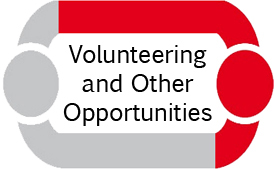 A, supposedly Christian, body which I know of was recently challenged as to why its leadership group needed paying when other leadership groups on similar bodies were not paid (even basic attendance expenses). The answer came back: 'no one works for nothing these days'. That, in my view shameful, response says more about the people who made it than the reality of volunteering in our society. Sure, the pace of contemporary life has put great stresses upon volunteering and the spirit of voluntarism itself. Church groups in particular are often very stretched today, due not least to changing patterns of family life, most parents at work, age, and other changing demands. Understandable legislative requirements and compliance can also make volunteering and the practice of the wider voluntary sector more onerous. Yet neither volunteering, nor the professional voluntary sector, is dead. On the contrary, without them, our society would quickly grind to a halt. Nor are they about amateurism in the negative sense. So today, as we celebrate the spirit of voluntarism in our parish with an office and volunteers party, I am giving thanks for volunteers - many of them deeply conscientious, immensely able and full of very professional gifts. I hope that the group of people who made their dismissive comment will reconsider. I know that they have a particularly challenging job to do at this time. Yet there is much much more to what they do than numbers, money and good organisation. Where the Christian spirit is weak, the flesh will also ultimately fail. 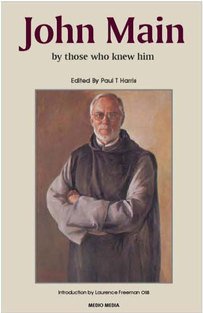 Later this afternoon I am leading the 'Silence for Peace' community meditation group which emerged out of the Toowoomba inter-faith and community meditation sharing and workshop event I helped organise earlier this year. The group - an idea of an increasingly good friend and wonderful inspiration Jo Anderson - was something I was eager to help create. It meets each week on Tuesdays at 5.30 pm at TRAMS (Toowoomba Refugee and Migrant Services) and has proven a delightful opportunity for many people of many different backgrounds to come together to deepen their sense of peace, silence and relationship with one another. Jo usually leads it beautifully but occasionally Penny and I help out. Tonight Jo is headed to Brisbane, partly to attend a session with Fr Laurence Freeman, who heads up the World Community of Christian Meditation. This body continues to grow and our own parish Christian meditation group (which meets at St Luke's, in the Parish Ministry Centre, each Wednesday at 5 pm) is an affiliate member. For myself, this practice has become an essential part of my life and well-being over the last six years or so. It owes so much to Fr John Main, the founder of the World Community of Christian Meditation, who helped revive the ancient practice of Christian Meditation, picking up the apostolic tradition taken up by the desert monastics and articulated by John Cassian. Today that tradition gives fresh life to Christians all across the world and, as in Toowoomba, to others of many faiths and none, in growing relationships of spirit together.  I am regularly grateful to my fellow ACSQ colleague, and Dean of Brisbane, Peter Catt for his typical measured, insightful and delightful handling of contemporary social ethical questions. Here (below, on video) is Peter's contribution to the recent public forum on Marriage Equality, organised in August this year, by Parents and Friends of Lesbians and Gays (PFLAG), at the Uniting Church, New Farm. The church's Reverend Chris Holden and some parishioners were in the audience to show their support, as were ordained clergy from multiple denominations. Penny and I sent our apologies, due to engagements in Toowoomba, but we continue to support the Marriage Equality movement and welcome the shedding of light, rather than heat, on this controversial but important question. In addition to Peter, speakers featuring in the public forum included Prime Minister Tony Abbott's sister Christine Forster, Human Rights Commissioner Tim Wilson, a Brisbane grandmother, Graham Perrett MP, psychologist Paul Martin, a Christian mother and others. Politicians from across the political spectrum were also represented, with speeches by Graham Perrett MP, Teresa Gambaro MP (in the audience), and a letter of support from Senator Larissa Waters read out. All of the videos from the forum can be viewed here http://www.pflagbrisbane.org.au/resources-multimedia/video 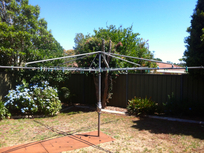 The Hills Hoist is one of the great Australian icons. It is in many ways redolent of much of modern Australia: happily and effectively secular, suburban and spiritually practical and pragmatic. It is simple, straightforward and sensible. It is easily owned by all cultures and backgrounds and found across the continent, from the cosmopolitan coast to regional backyards, to outback and desert landscapes. It requires no special insight, ritual or tradition. Yet the eye of faith may contemplate its cruciform design with wonder. Grounded in the sacred earth, clothed with humanity, raised to the heavens, its ordered, waiting, being is open to the dynamic grace and play of the elements, not least the sun and wind – metaphors of the life-giving Word and Spirit. Unassuming icon – heaven in ordinary. 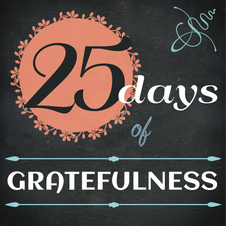 A remarkable thing is happening today. People of many different backgrounds are rediscovering the importance of gratefulness – giving thanks for the simple gifts of our lives. For giving thanks is a major source of happiness, even when things are really tough. Educationalists, workplace advisers, Oprah Winfrey, and many others, have found this for themselves and are commending this to others in their work. Oprah, for instance, has kept a journal for many years, in which, each day, she writes down five things for which she has been grateful. Others have tried this for a set number of days, like the Australian workplace guru Toni Powell with her 30 Day Challenge. For as we record those things which bring us strength and joy, we notice better those aspects of our lives which bring us happiness and we appreciate better the kindnesses and care of others. This is something which the world’s great wisdom traditions have always known, not least the Christian tradition, with its emphasis on appreciating the gifts of God born among us. So why not try a new way of approaching Christmas this year? For as we prepare for Christmas, we are often stressed about buying material gifts. Sometimes this can actually make us less grateful for the gifts of life and others around us! Perhaps what is really needed is not so much sharing special material gifts as appreciating the simple everyday gifts of life and one another. Why not then join with the Anglican Parish of St Luke Toowoomba in using the time before Christmas as a ‘season of gratefulness’? One way to do this is by using a Gratefulness Advent Calendar. It is easy to make one, or use an ordinary calendar for the month of December. What you do need are 25 boxes or spaces, one each for the first 25 days of December. These make up an Advent Calendar to help us cultivate gratefulness at this time. Each day of December, then fill in a box with 3-5 things, people, moments, or events which have brought you strength or joy (anything from the beauty of a flower or shaft of light, to the joy of a bird or animal, to an achievement or good coffee, video, book or meal, to the kindness or care of someone for you or others in trouble, or something heart-warming in the news). Maybe, if you write down a person’s name, you will also find a way to give thanks to them personally in a special way? Try this for the 25 days to Christmas and see what a difference it makes… Check out our Blog at http://stluketmba.wordpress.com and the Network for Grateful Living website at www.gratefulness.org Rejoice always, pray without ceasing, give thanks in all circumstances; for this is the will of God in Christ Jesus for you. (I Thessalonians 5.16-18) |
AuthorJo Inkpin is an Anglican priest serving as Minister of Pitt St Uniting Church in Sydney, a trans woman, theologian & justice activist. These are some of my reflections on life, spirit, and the search for peace, justice & sustainable creation. Archives
July 2024
Categories
All
|
 RSS Feed
RSS Feed